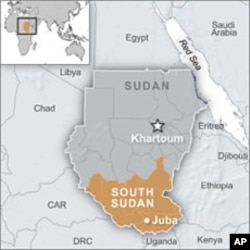South Sudanese officials say rebel attacks in an oil-rich area along the dividing line with north Sudan have killed at least six people in two days. The incidents come as southern Sudanese count down the hours until polls open for a week-long referendum on independence.
A spokesman for the Sudan People’s Liberation Army that is responsible for security in southern Sudan said the attacks occurred in separate clashes in neighboring states.
He said the rebels who have refused to sign an amnesty offer from the southern administration were seeking to disrupt the referendum that is due to begin Sunday.
Southern Sudanese next week are to decide in the long-awaited poll whether to remain united with northern Sudan or separate to form Africa’s newest nation.
The president of the south Sudanese regional government, Salva Kiir, said on the eve of the vote that there was no option but peaceful co-existence with the north.
Sudanese President Omar al-Bashir, in a visit Tuesday to the region, pledged to accept the results and help the south no matter the outcome.
An official with the Electoral Commission, Francis Kenyi, said voting materials had been distributed to all 26,000 polling centers across the vast territory.
"So, we have reached the last stage of the distributions knowing very well that today is the last day for us to complete everything," said Kenyi. "The remaining part will be the part for the polling centers’ peoples."
|
|
|
|
|
|
Nearly four million people have been registered for the vote which is part of a six year-old peace accord aimed at ending more than two decades of civil war.
Dignitaries from around the world, including elder statesmen Jimmy Carter of the United States, Koffi Annan of the United Nations and Thabo Mbeki of South Africa, are in the country to observe the vote along with hundreds of monitors deployed across the region.
The head of the United Nations Mission in southern Sudan, David Gressly, predicted an orderly vote. "There are many, many skeptics who thought we would never get to this point, certainly not on time. But it seems once again Sudan confounds many people. And in the end I think it is because the two parties made a determination they wanted to avoid going back to war," he said.
The war cost an estimated two million lives, many of them civilian. It also left an impoverished region lacking in schools, hospitals and infrastructure.
Many southerners say conditions have improved some since the peace accord. They hope independence will accelerate the progress.
Northern Sudanese say greater progress can be achieved through unity.
In order for the referendum to pass, more than 50 percent of the voters must cast yes ballots and turn-out must surpass 60 percent of the nearly four million registered voters.





